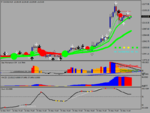Cornishpatriot
Newbie
- Messages
- 6
- Likes
- 0
Hi,
I have spent the last 5 months just reading books and watching videos (Anton Kreill)
So far I have worked my way through Tim Sykes: 'An American Hedgefund',(penny stocks). reminiscences of a stock operator by Edwin lefevre and Market Wizards by jack schwager.
My ultimate/dream goal is to be able to work self employed as a trader but every other post I read seems to contradict each other and warn me off against either being a day trader or forex trader.
The one thing I have noticed is that a lot of the big game winners seem to trade futures but literally, everyone warns newcomers off that until they are seasoned veterans of the industry.
So I kind of feel lost. Do I spend the next 6 months understanding the fundamentals of stocks or the technicals of forex? Or should I look at a completely different industry all together?
I have spent the last 5 months just reading books and watching videos (Anton Kreill)
So far I have worked my way through Tim Sykes: 'An American Hedgefund',(penny stocks). reminiscences of a stock operator by Edwin lefevre and Market Wizards by jack schwager.
My ultimate/dream goal is to be able to work self employed as a trader but every other post I read seems to contradict each other and warn me off against either being a day trader or forex trader.
The one thing I have noticed is that a lot of the big game winners seem to trade futures but literally, everyone warns newcomers off that until they are seasoned veterans of the industry.
So I kind of feel lost. Do I spend the next 6 months understanding the fundamentals of stocks or the technicals of forex? Or should I look at a completely different industry all together?

